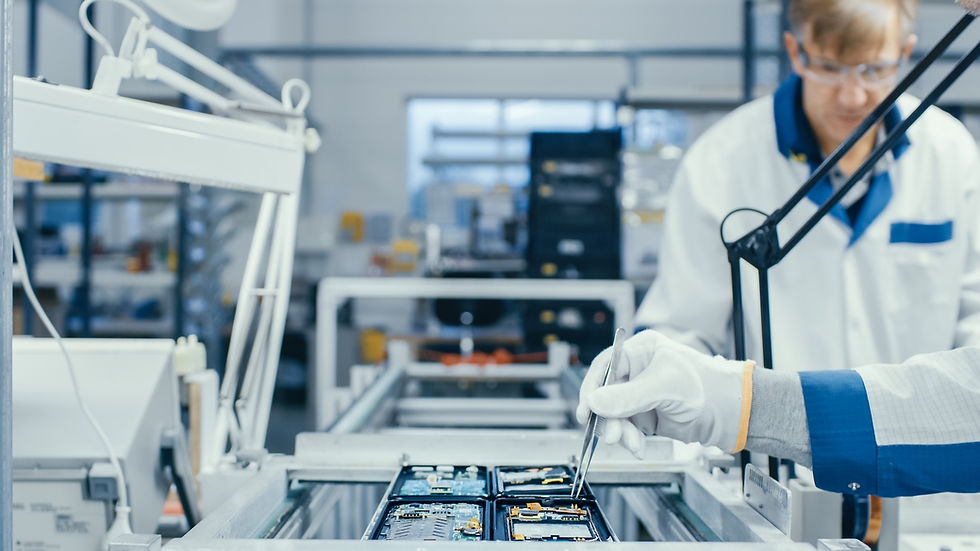Innovations in Electrical Engineering Revolutionizing Cleanroom Technology
- zachsievert15
- Apr 25, 2024
- 3 min read
Cleanrooms are the backbone of industries requiring high precision manufacturing, such as semiconductor fabrication, pharmaceutical production, biotechnology research, and aerospace engineering. These controlled environments maintain exceptionally low levels of airborne particles, contaminants, and microbes, ensuring the quality and integrity of sensitive processes and products. While the focus often centers on stringent cleanliness protocols and advanced filtration systems, the pivotal role of electrical engineering innovations in powering, controlling, and optimizing cleanroom operations cannot be overstated. This article delves deeper into the multifaceted applications of electrical engineering in cleanrooms and examines emerging trends shaping the future of cleanroom technology.

Advanced HVAC Systems: Engineering Precision Climate Control
Cleanroom HVAC (Heating, Ventilation, and Air Conditioning) systems are the cornerstone of contamination control, regulating temperature, humidity, and airflow.
Electrical engineers collaborate closely with cleanroom builders and cleanroom manufacturers to design and optimize HVAC systems to meet rigorous cleanliness requirements while ensuring energy efficiency and operational reliability.
Integration of sophisticated sensors, actuators, and control algorithms enables real-time monitoring and adjustment of environmental parameters to maintain optimal conditions within cleanrooms.
Robust Power Infrastructure: Safeguarding Uninterrupted Operations

Reliable power supply is essential for uninterrupted cleanroom operations, safeguarding against production disruptions and product contamination.
Electrical engineers collaborate with cleanroom engineering teams to design and implement redundant power distribution systems, incorporating backup generators and uninterruptible power supply (UPS) units to mitigate the risk of power outages.
Advanced power management solutions optimize energy usage and enhance system resilience, ensuring continuous operation even during unforeseen events in modular cleanrooms.
Illumination Solutions: Balancing Visibility and Contamination Control
Lighting plays a crucial role in cleanroom environments, providing adequate visibility for operations while minimizing the risk of contamination.
Electrical engineers work closely with cleanroom designers to deploy specialized lighting solutions tailored to cleanroom requirements, incorporating factors such as color rendering, intensity, and uniformity.
Adoption of LED technology, in collaboration with cleanroom manufacturers, not only improves energy efficiency but also reduces heat generation, contributing to the overall cleanliness and comfort of the environment in clean room facilities.
Automation and Control Systems: Enhancing Efficiency and Precision
Cleanroom automation, facilitated by electrical engineering innovations, minimizes human intervention and streamlines processes, enhancing efficiency and precision.
Programmable Logic Controllers (PLCs) and Supervisory Control and Data Acquisition (SCADA) systems, integrated by electrical engineers and cleanroom builders, enable centralized monitoring and control of cleanroom operations.
Integration of robotics, intelligent conveyors, and automated material handling systems, in collaboration with modular cleanroom manufacturers, optimizes workflow and reduces the risk of contamination from human interaction.
Data Acquisition and Analytics: Driving Continuous Improvement
Real-time data acquisition and analysis are essential for maintaining compliance with regulatory standards and ensuring product quality.
Electrical engineers deploy advanced sensors and data logging systems, in partnership with cleanroom engineering teams, to monitor environmental parameters, particle counts, and microbial levels.
Utilization of predictive analytics and machine learning algorithms, in collaboration with cleanroom designers and builders, enables proactive maintenance, optimizing equipment performance and minimizing downtime in clean rooms.

Electrical engineering stands at the forefront of innovation in cleanroom technology, enabling the design, implementation, and optimization of critical systems and infrastructure. From precision climate control and robust power distribution to advanced automation and data analytics, electrical engineers play a pivotal role in ensuring the cleanliness, efficiency, and reliability of cleanroom operations across diverse industries. As technological advancements continue to reshape the landscape of cleanroom technology, collaboration between electrical engineers, scientists, and industry experts, including cleanroom builders, designers, and manufacturers, will be paramount in driving continued innovation and meeting the evolving demands of high-tech manufacturing and research environments.
Are you ready to take the next step in your cleanroom build by designing and implementing innovative cleanroom facilities? Our team is here to guide you through every phase of the process. With our expertise in electrical engineering and cleanroom technology, we'll collaborate closely to turn your ideas into reality. Don't hesitate to reach out to us for expert assistance and personalized solutions. Contact us today at (855) 203-2958 or email us at contact@dtcdesign.us to start transforming your cleanroom aspirations into successful projects!"



Working in electrical engineering, especially in highly controlled environments like cleanrooms, teaches you that innovation isn’t just about new gadgets — it’s about making systems more reliable, efficient, and manageable. Even small battery testing inefficiencies can compromise sensitive processes, so technology must be precise, scalable, and easy to maintain. EMSYS Design, our mission is to modernize the battery service industry by applying the latest technologies in a practical, real-world way.